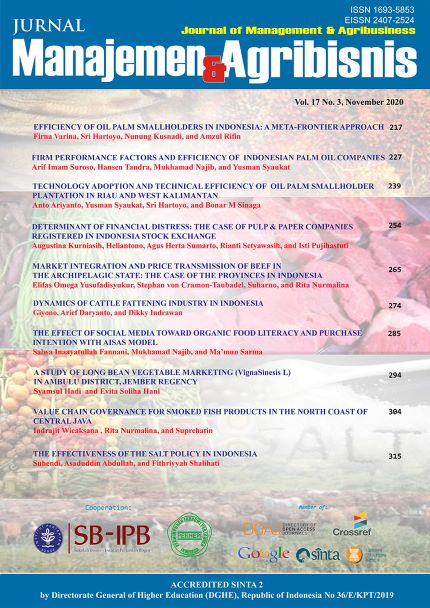THE EFFECT OF SOCIAL MEDIA TOWARD ORGANIC FOOD LITERACY AND PURCHASE INTENTION WITH AISAS MODEL
Abstract
This research aimed to analyze the effect of social media toward organic food literacy, analyze the effect of organic food literacy on consumer purchase intention, and analyze the components of the AISAS model that most effectively influence purchase intention. This research involved 150 respondents. Respondents consisted of social media followers from organic food sales account selected by the purposive sampling quota technique. Data collection was carried out using an online questionnaire. The SEM-PLS analysis in this research was used to analyze the direct effect of social media on organic food literacy and purchase intention based on AISAS modeling. The results of this study indicate that social media has a significant and positive effect on the attention, interest and search factors of consumers. Attention has a significant and positive effect on organic literacy from consumers. The share factor is the factor that most influences the consumer's buying interest of organic product. The influence given from influencer, friend, and relative testimonials is considered the most effective in attracting other consumers to buy. This can be used as a reference for organic product business people to find the most effective marketing method to attract consumer buying interest.
Keywords: social media, organic food literacy, purchase intention, aisas model, SEM-PLS
Authors
Authors who publish with this journal agree to the following terms:
- Authors retain copyright and grant the journal right of first publication with the work simultaneously licensed under a Creative Commons Attribution License that allows others to share the work with an acknowledgement of the work's authorship and initial publication in this journal.
- Authors are able to enter into separate, additional contractual arrangements for the non-exclusive distribution of the journal's published version of the work (e.g., post it to an institutional repository or publish it in a book), with an acknowledgement of its initial publication in this journal.
- Authors are permitted and encouraged to post their work online (e.g., in institutional repositories or on their website) prior to and during the submission process, as it can lead to productive exchanges, as well as earlier and greater citation of published work (See The Effect of Open Access).

